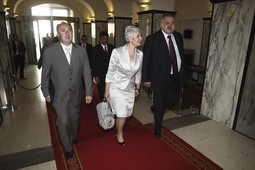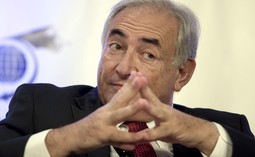BALANCING THE PUBLIC FINANCES Finance Minister Ivan Suker has vowed to carry out a serious reduction of government spending through two budget rebalances worth at least 11 billion kunaA new, major budget rebalance Government is to introduce into Parliament as early as by the first week in August will be based on the strict instructions of Croatian National bank (CNB) Governor Zeljko Rohatinski. This is the outcome of a meeting last week between the Governor, Prime Minister Jadranka Kosor and Finance Minister Ivan Suker, at which a strategy was hammered out with which Government will try to avoid a complete collapse of the public finances to the end of the year.
As Nacional has learned from sources close to top Government officials, the Prime Minister and Minister Suker have, to secure the Governor's support, vowed to carry out a thorough reduction of government spending through two budget rebalances worth at least 11 billion kuna. Government has accepted a model of better balanced public finances that Rohatinski has advocated for years without success during Ivo Sanader's time in office, and the Governor has in effect taken over the role of the chief architect of a new Croatian economic policy. In return, Rohatinski promised Minister Suker he will deposit a portion of the foreign currency reserves into the budget by the end of the year if he is satisfied with what Government is doing, something he has refused to do to date on several occasions. Suker, for his part, has received very broad powers in implementing an economic recovery program, powers he did not have during former Prime Minister Ivo Sanader's term in office.
Last week's deal is the basis for a much more active role for Governor Rohatinski in shaping public finances than has been the case in the past. What is more, relations between Government and the Governor should be at a much higher level in the future than in past years. The deal they have struck is the result of several events that occurred these past weeks, but above all the difficult situation in which Croatia currently finds itself. After ignoring the Governor's warnings to the effect that Croatian public spending is unsustainable on the long term for years, they have grasped in Government that there is no way to avoid unpopular savings measures this year, such as a reduction in wages and pensions, and that they need the widest possible social support for these measures. In that context the support of Governor Rohatinski is exceedingly important, as he currently enjoys a high level of public confidence. But to secure his support Prime Minister Jadranka Kosor had to agree to very precise and rigid conditions set before Government by the CNB Governor. Another key condition for this deal to be struck was the departure of Ivo Sanader from the post of Prime Minister. Relations between Sanader and Rohatinski have been at a very low level for some time now. The Governor, who has for years warned of excessive public spending and the fact that this policy was unsustainable on the long term, was very disappointed with the fact that he was frequently subjected to public disparagement from members of Sanader's cabinet because of his warnings. Sanader, on the other hand, was unwilling to implement the reforms Rohatinski was advising him to make, above all because he was unwilling to adopt unpopular, but necessary, decisions. Suker himself often proposed such measures, but Sanader rejected them all. This was the cause of frequent disagreement between the former Prime Minister and the Finance Minister, but also between Suker and Rohatinski, mostly because Suker had to implement and defend Sanader's policy in public, even if he often did not agree with it. The chief source of conflict between Suker and Rohatinski this past year was in fact the money in the foreign currency reserves. The Finance Minister, namely, has asked Rohatinski on several occasions to release some of the funds in the foreign currency reserves to cover some of the countries obligations and thus improve the liquidity of the domestic market. Rohatinski rejected these requests, and the disagreement on the reserves reached a peak in late March when Rohatinski decided to hold on to most of last year's profits from interest earned on the foreign currency reserves.
ZELJKO ROHATINSKI, the Croatian National Bank governorIn 2008 the CNB earned about 3.4 billion kuna from the foreign currency reserves, and Rohatinski sent only 1.34 billion to the national budget. Suker considered the possibility of having the remainder of the money transferred to the national budget, but abandoned the idea because he did not want to enter into a conflict with Rohatinski. On the other hand, those aware of the situation at the CNB interpret the Governor's conditional support of Government as his desire to, if possible, avoid the intervention of the International Monetary Fund. In his latest public statement, Rohatinski said he was opposed to seeking help from the IMF, saying that there was no need to do so given that the Fund would ask Croatia to implement reforms Croatia could implement on her own anyways. But Nacional's sources feel that this explanation is not very convincing and that Rohatinski is afraid that the IMF would ask Croatia to devalue the domestic currency which, according to the governor, would bring about the collapse of the domestic financial system. What this forecast is based on is unknown, but a fear of the devaluation of the kuna largely explains why the Governor demonstrated his willingness to help Government with money from the foreign currency reserves, something he has resisted for months now. It is well known that the basic premise of the monetary policy being led by the CNB is the stability of the kuna's rate of exchange against the euro. What is more, Rohatinski feels that even a minimal depreciation of the kuna would cause massive problems for the stability of the domestic monetary system. That comes as no surprise if one has in mind that fact that a mild drop in the kuna's exchange rate, to the level of 8 kuna for 1 euro, would result in Croatians earning one wage less per year on the average and paying one loan instalment more. The price of all imported products, and domestic products with imported components, would rise appreciably. And the state would have to set aside another 765 million kuna to pay off just the principal on external debt.
Rohatinski has told Prime Minister Kosor that Government can avoid this only by sharp and radical cuts in public spending. These cuts will be included in the new budget rebalance, which should be drafted by the first week of August. Based on these cuts it is already quite certain now that those employed in public services will earn 10 percent less come autumn than they do today, that pensioners will receive 10 percent lower pensions, and, as the basic cost of living will rise as a result of a higher VAT rate, it is not difficult to assume that the standard of living among Croatians will fall significantly. If one adds to this the fact that Government plans to make significant hikes in excise taxes, it is to be expected that Croatians will pay more for fuel, cigarettes, alcohol and telecommunication services as of this autumn. These measures are sure to cause negative public reaction and Croatia now faces a very politically volatile autumn.
A DANGEROUS YEAR FOR FINANCES The most critical period for the national finances will be in the first quarter of 2010, when 500 million euro in Eurobonds come due and economic activity is traditionally at it lowest ebbGovernment was unable to move right away to implement these measures, as it has to first create the legal groundwork for their adoption. That means amending some 30 laws, and Government's technical services are already working intensively on these amendments. Certainly the biggest intervention into the budget should be a higher Value Added Tax rate. This measure would probably increase national revenue, but the price would in the end by paid by the people, which is why Government is still restrained towards this measure. Minister Suker and his aids have considered the possibility of hiking the VAT rate by at most one percent, but Croatian Peasant Party leader Josip Friscic insists on twice that. If he gets what he wants and the VAT is increased to 24 percent, the state could earn 1.7 billion kuna more by the end of the year. Government could collect more by introducing an excise tax on SMS messages. By the forecasts of economist Zeljko Lovrincevic, currently Government's chief economic advisor, Croatians send about 4 billion SMS messages every year, and it is not difficult to calculate how an excise tax of one lipa per message would provide the state with a significant profit.
And Government has still not abandoned the idea of raising existing excise taxes, such as those on alcohol and tobacco, because they feel that these measures could be adopted without too much political fallout. In this context it is clear that Government will use the coming period for negotiations with the social partners in the Economic and Social Council (GSV) with the aim of convincing them to back the announced measures. For now the unions are sharply rejecting any possibility of a reduction in wages and pensions, and employers are not in favour of higher taxes and excise duties. And while it is already certain that the negotiations with the unions will be lengthy and difficult, employers are making their support of the announced reforms conditional on Government financing some of their demands, such as subsidies for a shorter working week. And employers want the country to at all costs prevent a further drop in the nation's credit rating, as that scenario would definitely prevent domestic companies from acquiring capital on the international market. This rating is currently very low, as was demonstrated by a failed attempt by the Croatian Bank for Reconstruction and Development to sell bonds worth 300 million euro at interest of under 8 percent. Besides radical budget cuts, employers are advising Government to hold a meeting with the IMF leadership and acquaint them with their future plans.
The position of employers that the struggle to preserve the credit rating is at this juncture critical to Croatian fiscal policy is understandable, especially if one takes into consideration the fact that Croatian Government will not long after this budget rebalance in August have to start preparing the budget for 2010. It is already clear that the first three months of next year will be particularly challenging for the national finances. Eurobonds worth 500 million euro come due for payment then, and with the weak economic activity early in the year and the current rating it has with foreign creditors, Government will have serious problems refinancing. That is why it is important that Government brings some order to the public finances by the end of the year. That is also exceedingly important because of another big problem for the Croatian economy, and that is illiquidity. It currently amounts to about 15 billion kuna, and is generated for the most part by large companies in majority or part state ownership. A budget rebalance will not address this problem, and Government will have to find a separate solution. It is a fact that state owned companies can hardly resolve their debts without incurring new debt, and that is very difficult at the moment, at least as far as foreign capital markets are concerned. That is why the struggle against domestic illiquidity depends largely on the willingness of domestic banks to provide credit to the economy.
DOMINIQUE STRAUSS-KHAN, the top man at the IMFAnd so Minister Suker will ask the heads of the major Croatian banks that they increase credit activity on the market, especially in the context of providing credit to state owned companies. As Nacional has learned, Suker will in return abandon an increase on the premiums commercial banks pay the State Agency for Deposit Insurance and Bank Rehabilitation (DAB) to insure savings deposits. Banks currently pay 0.1 percent of the value of deposits every three months. At the Ministry of Finance they have begun to consider increasing this premium, even as much as to 0.5 percent, but that is not likely to happen. Quite the contrary, the banks are expected to agree to Suker's request on an increase in the quantity of loans issued and thereby contribute in part to a reduction in illiquidity. This could help Government win the support of businesspeople, but it is uncertain at the moment whether it will succeed in hammering out a deal with the unions. They do not accept a reduction in wages and pensions, or a VAT hike, and if the possible negative effects of the tenders issued for the privatisation of the shipyards is added to this, a series of protests against Government's policies is to be expected in the autumn.
Government's tactics
■ The intention to present the new budget rebalance by the first week of August can be considered a tactical move of sorts given that this is the peak of the tourism season.
■ In Government they are clearly hoping that this period will significantly mitigate all of the negative effects of adopting the budget, such as possible protests by those social groups whose rights will be reduced in the new version of the budget.








